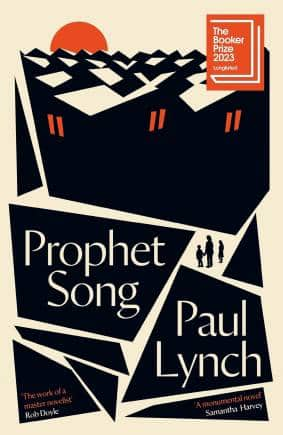



Most dystopian novels deal with the whole enchilada. In George Orwell’s Nineteen Eighty-Four, we come face-to face with Big Brother and his alarming strategies; in Aldous Huxley’s Brave New World, the classes and rituals of the new world are spelled out; and in Margaret Atwood’s The Handmaid’s Tale, the aims of the totalitarian state are inscribed on the lives of individuals. In contrast, Paul Lynch’s Booker-longlisted Prophet Song addresses a comparatively overlooked aspect of living under a dystopian regime: the daily, deadening effects of repressive circumstances. There are several descriptions of situations such as coping with blackouts and rumours, buying provisions during shortages, crossing armed checkpoints with and without identity cards, and people talking about how to simply get through the day.
 Prophet Song by Paul Lynch.
Prophet Song by Paul Lynch.This emphasis gives the novel a distinctive, dark texture. The effect is accentuated by Lynch’s prose, which is evocative and charged, with complex yet smooth sentences. “The darkening garden not to be wished upon now,” he writes at the start, “for something of that darkness has come into the house”.
The house is in a Dublin of the near future, occupied by Eilish Stack and her family. She lives with her husband, a trade union organizer, and their four children, from a toddler to a teenager. In response to what the state calls an ongoing crisis, an Emergency Powers Act is in effect throughout Ireland and the authorities have been given inflated powers to maintain their version of public order.
Eilish’s husband, negotiating for better working conditions and planning peaceful industrial action, is unexpectedly arrested and spirited away because his behaviour “looks like the conduct of someone inciting hatred against the state, someone sowing discord and unrest”. All of a sudden, Eilish finds herself in a precarious state. She must simultaneously navigate the legal process to secure her husband's release, attend to work, care for the children, and keep a watchful eye on her ageing father.
Eilish works as a microbiologist, and there are changes afoot in her department, too. Non-native employees vanish overnight, a new head steps in, and others proudly wear emblems of the new regime on their lapels. A colleague sympathetic to her plight says that the government is trying to change “what you and I call reality, they want to muddy it like water, if you say one thing is another thing and you say it enough times, then it must be so, and if you keep saying it over and over people accept it as true… you’re watching it happen in your own time and not in a book.” Nothing new under the sun.
Her nightmare continues, with unsuccessful attempts to locate and free her husband. It worsens when her eldest son is called up for compulsory national service and her father becomes increasingly woolly and irascible. There are reports of armed resistance that could spill over into civil war and the streets are bulging with soldiers, pregnant with violence, and bristling with checkpoints. Teargas is routinely employed and protest marchers are viciously assailed. Viral messages are rife, especially because, in keeping with grand despotic traditions, most news channels are manipulated while others are blocked.
Lynch shows how a tyrannical regime’s acts spread a miasma of suspicion and watchfulness into day-to-day lives. People look over their shoulders, prepare for eventualities, consider when to speak up and when to stay silent, and ultimately ask themselves if they should leave the country. It’s a decision that involves weighing the risks and rewards of an unauthorized journey against the ties that bind them to their land.
There are clear resonances with situations in other countries, and towards the end, Lynch adds another topical axis to the book. The plight of those attempting to cross borders and take perilous boat journeys becomes a compelling reminder that refugees are not alien creatures, but simply besieged individuals fleeing conditions not of their choosing. As Warsan Shire put it: “No one leaves home unless / home is the mouth of a shark.”
“The end of the world is always a local event,” cautions the prophet of the title. “It comes to your country and visits your town and knocks on the door of your house.” That’s a timely warning. Prophet Song is not an easy book to read, as much for its continuously heightened prose style as for the harrowing plight of its characters. Yet, in its vivid portrayal of a grim and plausible scenario, it raises essential questions of human dignity, rights, and survival.
Discover the latest Business News, Sensex, and Nifty updates. Obtain Personal Finance insights, tax queries, and expert opinions on Moneycontrol or download the Moneycontrol App to stay updated!
Find the best of Al News in one place, specially curated for you every weekend.
Stay on top of the latest tech trends and biggest startup news.